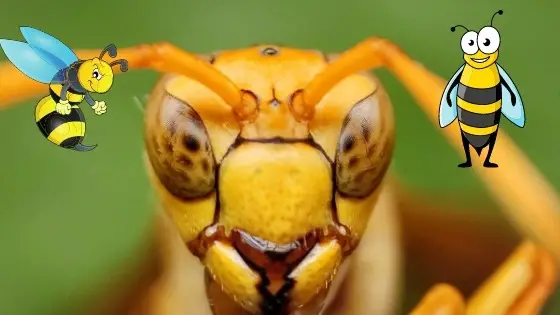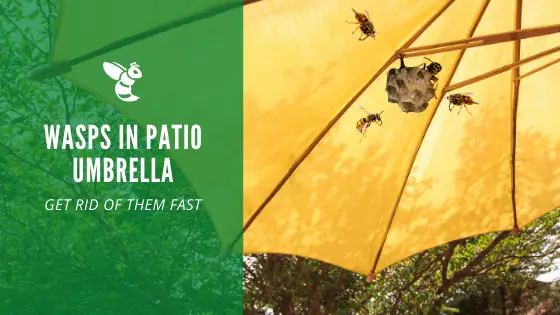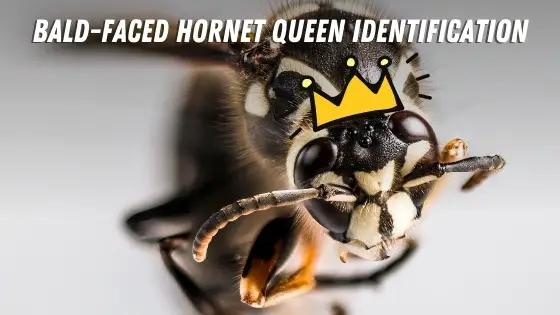Best Time to Spray Wasp Nest
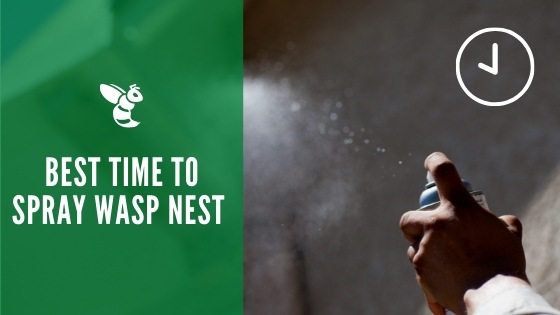
It’s common to see wasps flying around during the summer months, but the last thing you want to happen is to have them make their way into your home. Though not all wasps sting humans, a large majority of them do. It’s a good idea to get a wasp problem under control before it gets out of hand.
You may have already stopped by the store to invest in a product that is designed to kill wasps or made your own (soapy water), but do you know the best time to spray wasp nest locations? Having the right timing is half the battle.
When is the Best Time to Spray?
There are two times during 24 hours when it is best to spray a wasp nest. The first opportunity is during the evening hours when the sun is going down or has already gone down. Once the temperature begins to drop outside, the wasps will retreat to their nest for the night. They’re not going to come back out much until the morning comes.
Watch the activity going on around the nest. You should start to see many wasps going back into the nest, but they won’t be coming out as much. You want to wait until you get as many wasps back in the nest as possible. They will also be slowed down a bit by a large amount of activity they did that day.
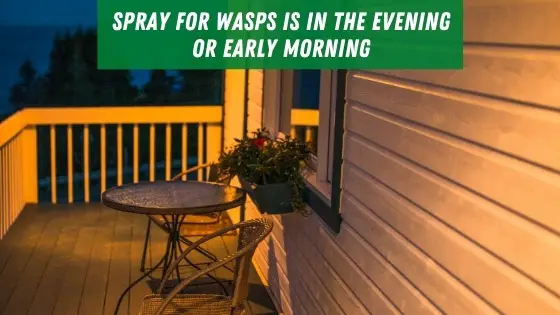
You can also spray a wasp nest in the early morning hours before the sun is fully up. The wasps will still be less active, and they should all still be in there. If you see a lot of activity going on in the morning, it might be wise to wait until that evening to spray. Wasps are very active during the day as they work to find food and expand their nest.
By the end of the summer, the nest is as large as it’s going to get. If you’re approaching summer, make sure that you address the nest before the winter. Once the weather gets very cold, and temperatures are below freezing, you can easily physically remove the nest to get rid of it.
How do You Spray a Wasp Nest Without Getting Stung?
If you’re using a spray, you will want to read the directions thoroughly before spraying the nest. Most sprays will advise you to spray directly into the main opening of the nest, where you see wasps coming in and out. You want to saturate this area, so the spray works its way inside; aim to spray for about 25 seconds before stopping. If the wasps become agitated and come after you, you’re probably wondering what you should do. How exactly can you spray a wasp nest without getting stung?
Planning an Escape Route
Before you head over to the nest, you’ll want to get a few things in order. Plan your escape route ahead of time. If anything goes wrong with the process of spraying the nest, you’ll need to get somewhere safe in a short amount of time. That means you may want to leave a back door open nearby.
You should also wear protective clothing when you’re spraying. Not only will your gear protect you from getting attacked by wasps, but you’ll also be protecting yourself from coming into contact with the toxic spray that you’re using. Make sure that you’re covering all of your body parts so nothing is exposed. Wear long sleeves, pants, socks, shoes, a hat, and gloves. You want to stay covered, but make sure that you can remain relatively mobile while spraying.
Will Wasps Return to a Sprayed Nest?
Once you’ve sprayed a wasp nest, you may be wondering if there are wasps that will be returning to the nest. There are a few scenarios to take into consideration. For one, there may be wasps that quickly escaped the nest when you began to spray the nest area.
If these wasps didn’t come into contact with the wasp spray, they would live. They may return to the nest at some point to see if they can go back into their nest. Once they realize the nest has been compromised, they’ll likely move on. You need to make sure that you’ve sprayed the nest adequately.
There may have been wasps that were not yet in the nest when you sprayed. When you spray the nest, you will have eradicated the wasps inside the nest at that time. However, other wasps may return to the area later on. This is why you may need to keep an eye on the nest over the next few days. If you still see wasp activity, you’ll want to spray the area again if the wasps are not leaving.
What if I Have Ground Wasps?
Certain species of wasps make their nest inside the ground, like the yellow jacket wasp or the ground hornet. Their nest will look very different than the one that you’ll find hanging under the eaves of your home or up in a tree, but you should still address this problem. You can easily aggravate and stir up the wasps if you pass over the nest without knowing.
Unfortunately, aerosol sprays don’t work as well with ground hornets or wasps. You should turn to a powder-based product that you sprinkle in and around the hole where you see the wasps coming in and out of. The goal is to have the wasps contact the powder as they move into and out of the nest. They will transfer to powder into areas where other wasps are located, thus killing the colony. Common powders used on ground wasps are diatomaceous earth. delta dust, and boric acid.
Though wasps may be harmless in many situations, you need to prevent them from coming into the house or building a nest near an entryway. If a colony gets big enough in the wrong location, this can be quite a nuisance. Take your time to observe the wasps, and use your products accordingly.
If the wasps are too aggressive or the nest is too large for you to manage on your own. You should contact a pest control professional before you are dealing with a wasp infestation.
Sources:
https://www.canr.msu.edu/news/getting_rid_of_wasps_nests
https://blog.fantasticservices.com/how-to-get-rid-of-a-wasp-nest/

